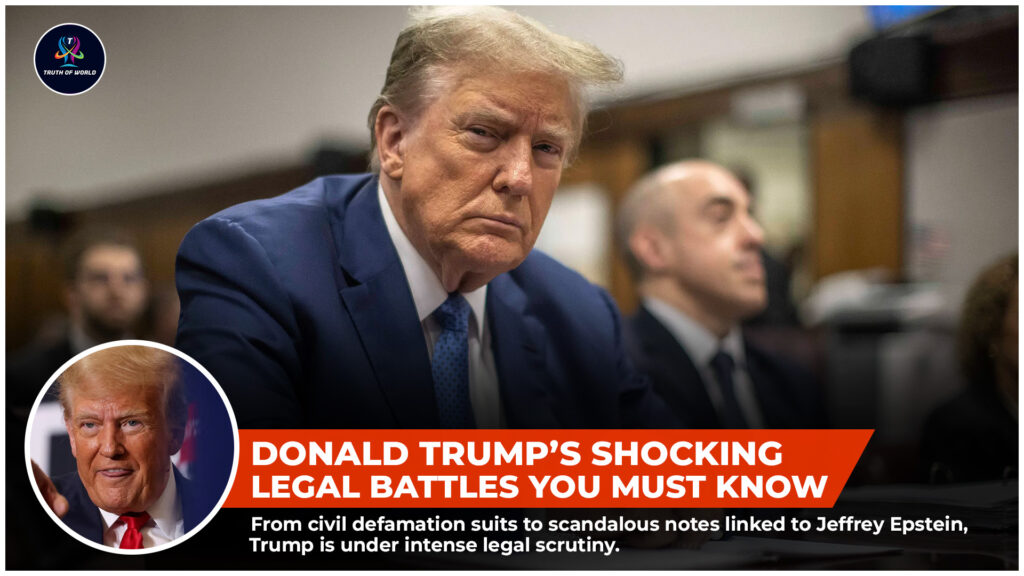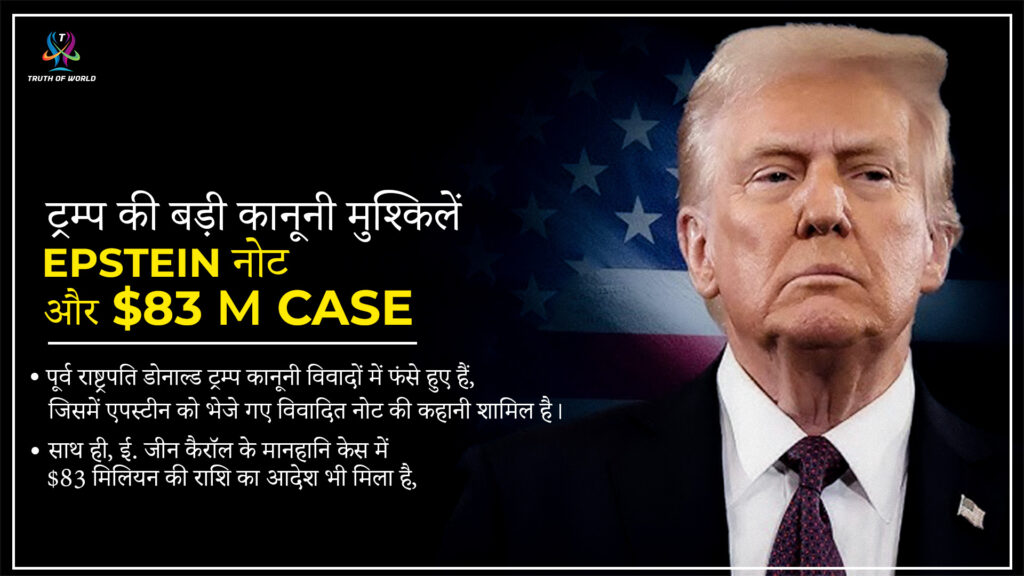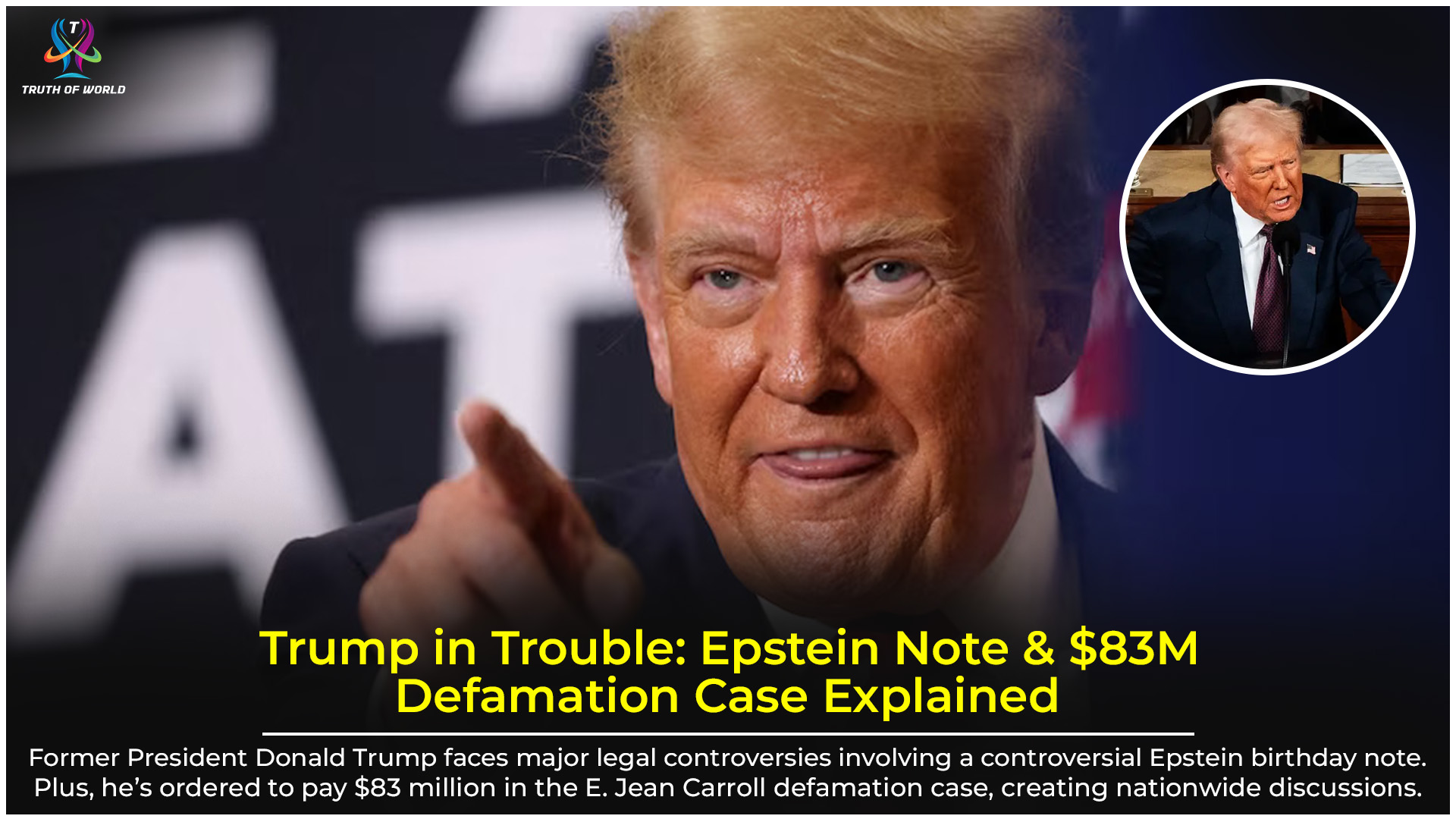Meta Description (SEO-Friendly):
Get a complete guide on Donald Trump’s latest legal controversies, including the Epstein birthday note scandal and the E. Jean Carroll defamation lawsuit. Understand the timeline, details, and political impact in this comprehensive article.
Introduction
Donald Trump, former President of the United States, remains a prominent figure not only in politics but also in legal circles. Even after leaving the White House, Trump continues to attract significant media attention due to multiple legal controversies. Two recent and highly publicized cases include the Jeffrey Epstein birthday note scandal and the defamation lawsuit filed by journalist E. Jean Carroll.
These cases have sparked nationwide discussions about accountability, ethics, and the legal limits for public figures. Understanding these issues requires an in-depth look at the facts, legal interpretations, and broader social implications. This article will provide a comprehensive, human-like explanation of these controversies, including timelines, expert opinions, and potential outcomes.
The Jeffrey Epstein Birthday Note Controversy
Background on Jeffrey Epstein
Jeffrey Epstein, a financier and convicted sex offender, was notorious for his high-profile connections with politicians, celebrities, and business leaders. Epstein’s arrest and subsequent death in 2019 revealed a vast network of alleged sexual exploitation, bringing attention to many of his associates, including Donald Trump.
What Is the Birthday Note?
Recently, House Democrats released a birthday note allegedly sent by Trump to Epstein. The note reportedly contained sexually suggestive language, prompting concerns about Trump’s relationship with Epstein.
Key points of the controversy:
- The note is claimed to be written by Trump and contains inappropriate undertones.
- Democrats allege that this reflects Trump’s personal connection to Epstein.
- Legal experts note that while the note may not constitute a criminal offense, it could have social and political implications.
Trump’s Response
Donald Trump has strongly denied sending the note. He labeled the report as politically motivated and referred to it as a “fake scandal.” Trump’s legal team argues that the note’s release is an attempt to damage his reputation, particularly ahead of future political campaigns.
Public and Media Reaction
- The media has widely covered the story, analyzing its potential implications.
- Public reactions have been divided, with supporters defending Trump and critics expressing concern about the alleged association with Epstein.
Legal Implications
While sending a note itself may not be illegal, the controversy raises broader questions about the ethical and social responsibilities of public figures. It also adds to the narrative of Trump’s controversial personal and professional relationships.

E. Jean Carroll Defamation Case
Background
E. Jean Carroll, a well-known journalist and author, accused Donald Trump of sexual assault during the 1990s. Carroll alleged that Trump assaulted her in a department store, a claim he has consistently denied. After Trump publicly dismissed her accusations, Carroll filed a defamation lawsuit, arguing that his statements had harmed her reputation.
Timeline of the Case
- 1990s: Alleged assault incident.
- 2019: Carroll publicly accuses Trump of sexual assault.
- 2019-2020: Trump denies allegations, calling them false.
- 2020: Carroll files defamation lawsuit.
- 2025: Federal appeals court upholds an $83 million judgment against Trump.
Court Ruling and Reasoning
The federal appeals court ruled that:
- Trump’s public denials were made with reckless disregard for Carroll’s safety and reputation.
- The $83 million defamation judgment is upheld, signaling the court’s firm stance against harmful statements by public figures.
Trump’s Appeal Plans
Trump intends to appeal the ruling to the Supreme Court. Legal experts suggest that the appeal could continue for several years, potentially creating new precedents for defamation cases involving high-profile individuals.
Impact on Trump’s Image
- Supporters argue that Trump is being unfairly targeted due to his political prominence.
- Critics believe the case highlights a pattern of dismissing accountability.
- Public opinion is deeply polarized, reflecting broader political divisions in the United States.
Comparing the Two Cases
While the Epstein note controversy and the E. Jean Carroll defamation case are distinct, they share common themes:
- Public Scrutiny: Both cases keep Trump in the media spotlight, influencing public perception.
- Legal and Political Consequences: They raise questions about the boundaries of personal behavior and political influence.
- Long-Term Implications: These cases could affect Trump’s political aspirations, particularly if legal decisions shape public trust.
Political Implications
Donald Trump’s ongoing legal battles are likely to have political ramifications, especially if he pursues another presidential campaign.
Potential Impact on Voter Perception
- Legal controversies may sway undecided voters.
- Supporters may see him as a victim of political targeting, reinforcing loyalty.
- Critics may view him as unaccountable, influencing opposition strategies.
Media Coverage and Influence
- Extensive media coverage amplifies public awareness.
- Social media platforms have played a key role in spreading information, both supportive and critical.
Future Campaign Considerations
Trump’s team may need to manage legal challenges alongside political messaging. Navigating court proceedings while maintaining a public campaign will require careful strategy and public relations efforts.
Legal Analysis and Expert Opinions
Defamation Law in the U.S.
Defamation involves making false statements that harm someone’s reputation. Courts assess:
- Truthfulness of Statements: False claims are punishable.
- Intent: Reckless disregard for the truth can strengthen a defamation case.
- Public Figures Standard: High-profile individuals have limited protection; they must prove statements were made with actual malice.

What Experts Say About Trump’s Cases
- Epstein Note: While not a criminal matter, the note could affect reputation and political credibility.
- E. Jean Carroll Case: The upheld judgment emphasizes accountability for public statements, particularly when targeting individuals.
Potential Outcomes
- Appeals could continue for years.
- Supreme Court review may redefine legal precedents.
- Public perception may shift based on court rulings and media narratives.
Timeline Summary
| Year | Event |
|---|---|
| 1990s | Alleged sexual assault on E. Jean Carroll |
| 2019 | Carroll publicly accuses Trump |
| 2019-2020 | Trump denies allegations; Carroll files defamation lawsuit |
| 2025 | Federal appeals court upholds $83 million judgment |
| 2025 | House Democrats release Epstein birthday note |
Q1: Could Trump go to jail because of these cases?
A1: No, neither case currently involves criminal charges. The Carroll case is civil defamation, and the Epstein note is not a legal offense.
Q2: Will these controversies affect Trump’s political career?
A2: Possibly. Legal controversies can influence voter perception and media coverage, which may impact campaigns.
Q3: How long will the appeals take?
A3: Appeals, especially to the Supreme Court, can take years before final resolution.
Q4: Are these cases related?
A4: They are separate cases but collectively affect public perception of Trump’s behavior and accountability.
Donald Trump’s legal controversies continue to capture global attention. The Epstein birthday note and the E. Jean Carroll defamation case highlight the complex intersection of law, politics, and media influence. While the legal outcomes remain uncertain, these cases underscore the importance of accountability for public figures and the role of courts in upholding justice.
As legal proceedings continue, staying informed through credible, fact-based reporting is essential for understanding the broader implications for Trump, the U.S. legal system, and the political landscape.
Author: Ronak Sharma is a digital content creator and writer who focuses on current affairs and legal news. He creates informative, easy-to-understand articles for readers.




